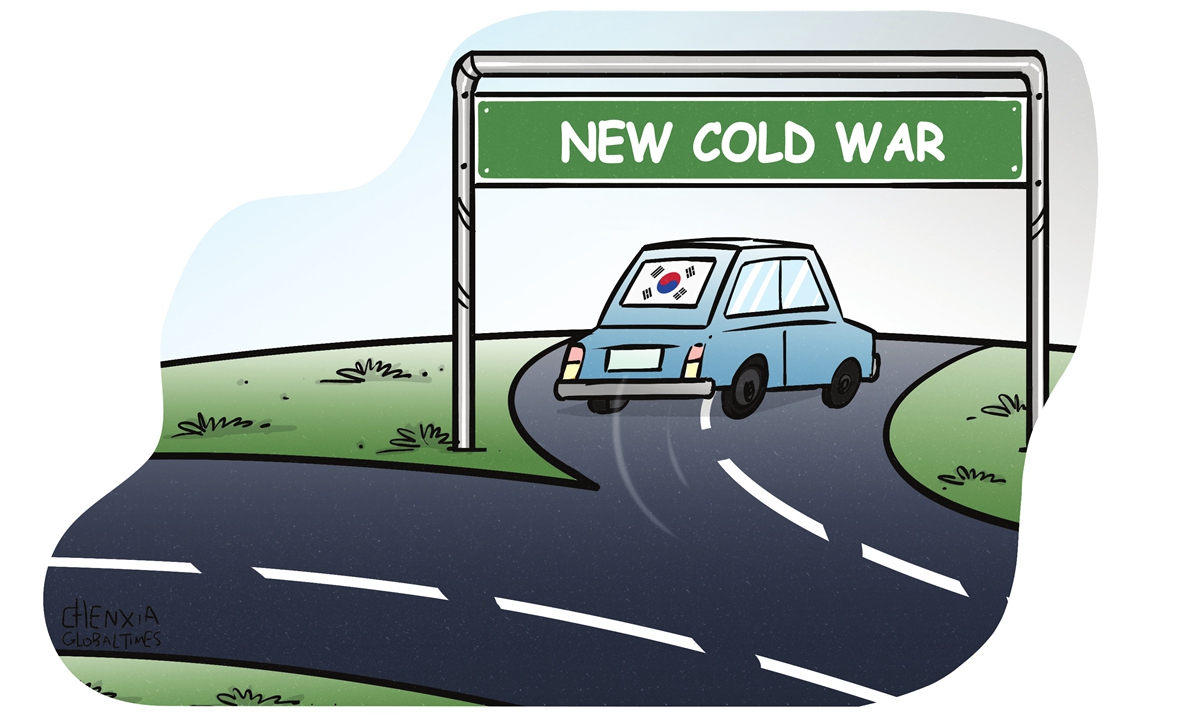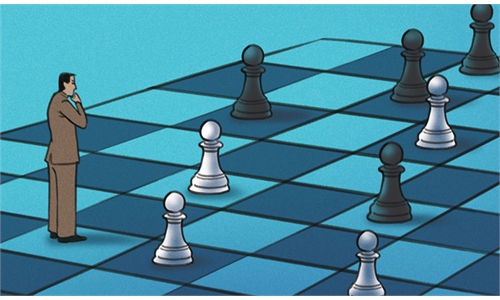
Illustration: Chen Xia/GT
The atmosphere in China-South Korea relations is not very good these days. This is a result of Seoul's attempts to return to the diplomatic attitude of the Cold War and its frequent suspected interference in China's internal affairs.When the Cold War was coming to an end, then-president Roh Tae-woo saw the trend of an easing global situation and seized the opportunity of a major international change to pursue Nordpolitik ("Northern Policy") actively. This opened his country's door to contact with the major socialist countries of the time, the most notable of which was undoubtedly the establishment of diplomatic relations between China and South Korea.
As a result, South Korea hitchhiked China's rapid economic growth. Without the unbinding from the Cold War and the all-around integration with China, it would have been difficult for South Korea to grow into a world trade power. Seoul's bid to move away from the Cold War era has, in turn, contributed to globalization, and Beijing has also significantly benefited from it.
The post-Cold War presidents in South Korea, especially those from the Democratic Party, have worked hard to dissipate the remnants of the Cold War on the Korean Peninsula and to resolve the Korean Peninsula issue peacefully through dialogue and negotiation. Such efforts have yielded some results, yet they also encountered various obstacles for many reasons.
In particular, they are hindered mainly by some non-regional countries that hate to see the disintegration of the Cold War-era structure on the Peninsula. Moreover, some other countries, which had reaped economic and other benefits from the Korean War, are still considering pushing for new tensions on the Peninsula again, thus creating new opportunities to turn South Korea into a military power. The current South Korean government has turned a blind eye to this.
In fact, South Korean society today lives in a peaceful, stable and prosperous Northeast Asia, so much so that some political elites in the country don't consider South Korea's history of being colonized a century ago and seem to have forgotten the Korean War that took place more than 70 years ago. Such peace, stability and prosperity is precisely the result of the pragmatic and friendly diplomacy pursued by the countries concerned during the post-Cold War era.
However, South Korea is attempting to return to its old way, using a Cold War perspective to view and deal with today's international relations. It issued the Washington Declaration, which it regards as the second Mutual Defense Treaty with the US, and voluntarily jumped into a "new Cold War trap" set by the US. Seoul even pleaded with Washington to use nuclear weapons against its own homeland "when needed" and asked the US and Japan to form a "trilateral yoke" that limits its sovereignty.
There is nothing wrong with Seoul treating "freedom" as a faith. But mistaking a country for faith and believing it is, therefore, safer, South Korea will be pushed off the edge of a cliff. Seoul should not forget that in Asia, South Korea is a direct victim of the Cold War, and its diplomacy should prioritize getting rid of the shackles of the Cold War. Fostering the atmosphere of a "new Cold War" will only increase the vulnerability of South Korea's security.
Once the security situation on the Peninsula deteriorates, South Korea itself will bear the brunt, especially in the nuclear age. That is why, even during the Cold War, South Korean leaders with a strategic vision tried to seek a détente with North Korea.
Wednesday marks the first anniversary since South Korean President Yoon Suk-yeol took office. The latest statistics show that South Korea has been running a trade deficit for 14 consecutive months, a scene only seen on the eve of the 1997 Asian financial crisis. In particular, South Korea's exports to China have declined for 11 consecutive months. This situation has not been observed since China and South Korea established diplomatic relations.
We don't know how much this directly relates to South Korea's policy toward China. However, we can see such an interesting phenomenon: Seoul, on the one hand, blames its trade issues on external factors such as China-US competition, the Russia-Ukraine conflict, and the "weak Chinese economy;" and on the other hand, it continues to take actions that are likely to impact its relations with China, while still expecting the Chinese economy to boost South Korean exports in the second half of the year.
At the end of the day, how South Korea pursues its diplomacy is the country's own business, and it is Seoul's own decision if it really wants to return to the Cold War mentality. But an objective reality cannot be ignored: Getting involved in the "new Cold War" and practicing "Cold War-era diplomacy" is not in South Korea's national interests, nor is it conducive to developing China-South Korea relations. It will also affect regional peace and stability.
In this sense, peace should be the highest value to be pursued by all countries, while creating peace should be the common task of all. Thus, a nation should, above all, completely abandon the Cold War mentality and dismantle the Cold War structure instead of returning to the Cold War era.
The author is the director and professor at the Center for Korean Peninsula Studies at the Shanghai University of International Business and Economics. opinion@globaltimes.com.cn

